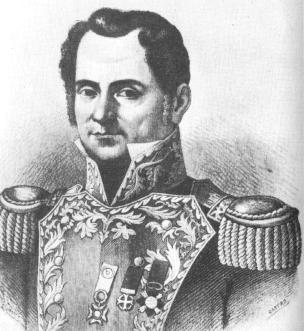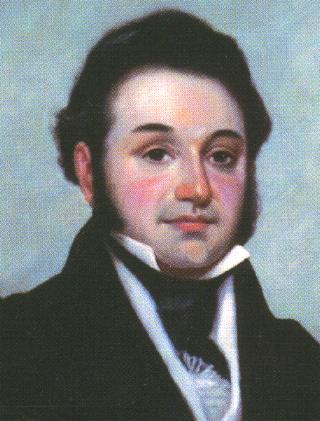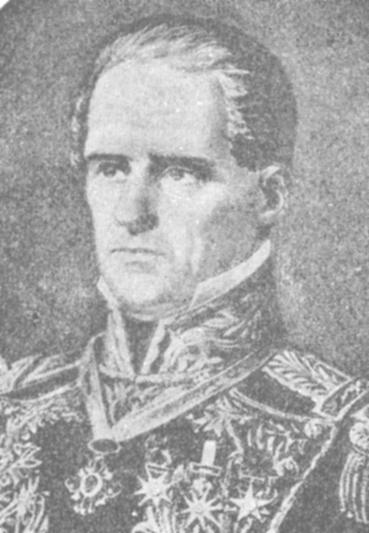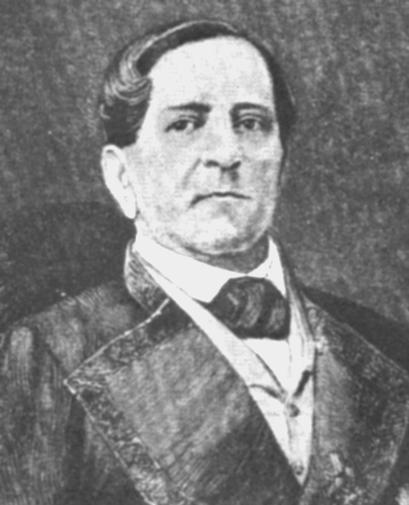SONS OF DEWITT COLONY TEXAS
©1997-2018, Wallace L. McKeehan, All Rights Reserved
Coahuila y Tejas | Republic of Texas
Previous page---Viceroys, Commandants and Governors over Spanish Texas
Independent Mexico
Revolutionary Chieftains | Emperor | Executive Junta | Presidents
For more biographies, Search
Handbook of Texas Online
Click on photos for biographical sketches
EMPEROR OF INDEPENDENT
MEXICO
1821-1823

Agustín Iturbide
"Mexicans!...tell your children ...to think
with kindness of the first Chief of the Army of the Three Guarantees...if my children
should stand in need of your protection, remember that their father spent the best season
of his life in laboring for your welfare!"---Prior to
execution 1824 on order of the Poder Ejecutivo
Junta Nacional Instituyente
Juan Francisco (Bishop of Durango)-President
Antonio de Mier-Secretary
Juan Batista Arispe-Secretary
Executive Junta (Poder
Ejecutivo)
Nicolás Bravo, Pedro Celestino Negrete, Guadalupe Victoria
Miguel Dominguez, Vicente Guerrero, José Mariano Michelena
Lucas Alamán-Minister of Foreign
& Domestic Relations
José Manuel Herrera-Minister of
Interior & Exterior Relations
Manuel Mier y Terán-Minister
of War & Navy





(Photo Credit: Iturbide, Negrete, Dominguez, Michelena from The
Charlotte & Maximilian Collection)
PRESIDENTS REPUBLIC OF MEXICO 1824-1846
Guadalupe Victoria. Oct 10, 1824-Apr 1, 1829

Nicolás Bravo-Vice-President
Lucas Alamán y Escalada-Minister
of Relations
Manuel Gómez Pedraza-Minister of War



Vicente Guerrero. Apr 2, 1829-Dec. 18, 1829
"He had in defense of his country fought so
bravely, that on such an occasion he might give vent to his feelings, and weep at her
ingratitude."--Wept bitterly prior to execution 14 Feb 1831, Oaxaca on
orders of Lucas Alamán.

Anastacio Bustamante-Vice-President
Lorenzo de Zavala-Minister of
Treasury/Pres. of Cabinet (resigned)
José Manuel Herrera-Minister of Justice & Ecclesiastics
Francisco Moctezuma-Minister of War & Navy
José M. Bocanegra-Minister of
Interior then Treasury
Augustín Viesca-Minister of Relations



José María Bocanegra, ad
interim. Dec. 19, 1829-Dec. 23, 1829
Mr. Bocanegra, the Minister of Foreign Affairs, was a distinguished lawyer, and was
also one of the judges of the Supreme Court. He left the Bench in 1841, to enter the
Cabinet of General Santa Anna. Everybody in Mexico speaks of him as an eminent and
virtuous judge. I presume that there are more questions and involving a greater
variety of principles of international law, which are thrown upon the American legation in
Mexico, than on any other of our foreign missions.....I can say in all sincerity, that
whilst I found him always faithful to his own country, and tenacious of her interests,
that he was uniformly courteous and fair; and never sought any of those small advantages
which many erroneously suppose to be the duty of a diplomatist. As a companion, he
was eminently joyous and convivial. I entertained for Mr. Bocanegra great respect,
and a very sincere regard. That Mexico may find a man who will conduct the business
of the office of Minister of Foreign Affairs with more ability and success, is, I think,
little to be expected---American envoy Waddy Thompson 1846.
Pedro Velez (below
left), Luis Quintanar, Lucas Alamán
(below right)
Provisional Government. Dec. 24, 1829-Dec. 31, 1829


Anastacio Bustamante. Jan 1, 1830-Aug. 14, 1832

Lucas Alamán-Minister
of Interior & Foreign Relations
José Ignacio Espinosa Vidaurre-Minister of Justice & Ecclesiatics
Rafael Mangino-Minister of Treasury
José Antonio Facio-Minister of War & Navy
Melchor Musquiz, ad interim.
Aug. 15, 1832-Dec. 24, 1832.

Manuel Gómez Pedraza.
Dec. 25, 1832-Apr. 1 1833

Valentin Gómez Farias, acting. Apr. 2,
1833-May 16, 1833

For high endowments, and spotless purity of character, public and private, Gomez
Farrias would be a rare man in any country. The only fault I ever imputed to his is
that he is too much of an "exaltado"; that he carries his ideas of liberty to an
extent impractible in Mexico; or in other words, that he is too great an admirer of our
institutions, and endeavors to assimilate those of Mexico too much to them---American
envoy Waddy Thompson, 1846.
Antonio
López de Santa Anna. May 17, 1833-June 3, 1833

Valentine Gómez Farias-Vice President
Valentin Gómez Farias,
acting. June 4 1833-June 18, 1833
Antonio López de Santa Anna.
June 19, 1833-Jul 5, 1833
Valentin Gómez Farias, acting. May 6, 1833-Oct 27, 1833
Antonio López de Santa Anna. Oct. 28, 1833-Dec. 15, 1833
Valentin Gómez Farias, acting.
Dec. 17, 1833-Apr. 24, 1834
Antonio López de Santa Anna. Apr. 25, 1834-Jan. 28, 1835
Miguel Barragan. Jan. 29, 1835-Feb. 27,
1836

A.D. Manuel Diez de Bonilla-Minister Interior Relations
José María Tornel-Minister of War and Navy

General Tornel, the Secretary of War, is a remarkably fine looking, and in every
respect, a striking man. He would be regarded as an accomplished man in any country.
He is very elegant, sometimes an able writer. He well deserves the title of
"The patron of Learning in Mexico," and has entitled himself to the lasting
gratitude of his country, for his continued and successful efforts, for the establishment
of schools and colleges, and the diffusion of learning among his countrymen. If what
I sometimes heard in Mexico is true, there is another and less favorable side of the
picture. But of all the cities in the world, Mexico is the most gossiping, and I
should be restrained from saying anything disparaging of General Tornel, from the
consideration that there was a pretty violent collision between us a few days after my
arrival in Mexico, and that our relations were for some time of a very unfriendly
character, and never very cordial---American envoy Waddy Thompson 1846.
José Justo Corro. Feb. 28, 1836-Apr.
19, 1837

Anastacio Bustamante. Apr. 20, 1837-Mar. 18, 1839

Antonio López de Santa Anna. Mar. 19, 1839-July 10, 1839
Nicolás Bravo. Jul 11, 1839-Jul 17, 1839

Anastacio
Bustamante. July 18, 1839-Sept. 22, 1841
Juan N. Almonte-Minister of War
J. M. Echevarri. Sept 23, 1841-Oct 10,
1841

Señor Echevari, who is, or very lately was Minister of Finance, is, I believe, only
distinguished for great wealth, and a great hatred of all foreigners---American envoy
Waddy Thompson, 1846
Antonio
López de Santa Anna. Oct 11, 1841-Oct. 26, 1842
Nicolás Bravo, substitute.
Oct. 27, 1842-Mar 5, 1843
Antonio López de Santa Anna.
Mar. 6, 1843-Oct. 4, 1843
Valentin Canalizo. Oct 5 1843-June 4, 1844

Paredes, Valencia, and Canalizo were the three Generals in the
most important commands under Bustamente. Paredes and Valencia went over to Santa
Anna, and thereby consummated the overthrow of Bustamente's government. Canalizo
adhered with a noble fidelity to the fortunes of his chief, and after Bustamente was
vanquished, Canalizo held out for a long time at the head of only three hundred men, and
by his remarkable gallantry obtained the sobriquet of the "Lion of
Mexico." As soon as Santa Anna was firmly seated in power, he showered favors
of all sorts upon Canalizo; amongst other things, appointing him president ad interim
during his own absence from Mexico. He very soon quarreled with Valencia and
Paredes. The former gave up his command, and the latter was arrested and imprisoned
in the little town of Tula, thirty miles from Mexico---American envoy Waddy Thompson
1846.
Antonio López de Santa Anna June 5, 1844-Sept.
20, 1844

Valentin Canalizo.
Sept 21, 1844-Dec. 6, 1844

José Joaquin de Herrera,
Dec. 7, 1844-Dec 30, 1845

Of General Herrera, I only know that he is an old General of good character and
talents, but so far as I am acquainted remarkable for nothing--American envoy Waddy
Thompson 1846.
The government of Herrera was, no doubt, correct, and seemed calculated to advance the great interests of the country. There is little doubt that he foresaw the consequences which were likely to result to Mexico from a war with the United States, and sought by conciliatory means to avert it. It was however in vain for the whole army under Paredes pronounced against him, and he was deposed in November, 1845.....Paredes power was short-lived; Santa Anna returned, and Herrera was excluded from military command until the last struggle of the president at Cerro Gordo, when, with La Vega, and the best men of the Mexican army, he was taken prisoner in the entrenchments from which Santa Anna fled. He was there paroled by General Scott, and returned to the capital.....The avowed reason of his deposition, after the exile of Santa Anna, was, that he was suspected of wishing to receive the American minister and consenting to the final relinquishment of Texas. General Thompson speaks of Herrera as a man confessedly of high character, but in no other respect remarkable. Madam La Barca says as much. Can there be higher praise in Mexico, where some strength of mind is required to withstand the temptations to corruption?---Fay Robinson in Mexico and her Military Chieftains, 1847.
Maríano Paredes y
Arrillaga. Jan 5 1846-Jul 28 1846

General Paredes, the author of the revolution, which terminated in the overthrow and
banishment of Santa Anna, is a man of talents and acquirements in
his profession, and all speak of him as a gentleman and a patriot. But some how or
other, no one looks to him for the Presidency. I do not know how this happens,
unless it is that he is opposed to the Federal party, and Santa Anna was at the head of
the other party. And besides that, Paredes, Valencia, and Tornel,
were the three most prominent men in Mexico. But there was a tripartite jealousy and
hatred between them which always secured the combination of two of them against the
other.....I know, when I left Mexico [1844], that Paredes was only waiting for the proper
moment to strike, and that his friends in Guadalajara were perfectly organized.....This
unfortunately for himself Santa Anna gave them. Reposing in the false security that
his flatterers had made him believe that he enjoyed, and no longer apprehending any danger
from Paredes, he appointed him governor of Sonora....Paredes passed through Guadalajara,
and his arrival there was the signal for the pronunciamento which resulted in the defeat
and overthrow of Santa Anna.---American envoy Waddy Thompson 1846.
The Republic of Texas was annexed to the United States in 1846, in July 1846 after invasion of Mexico by US forces, Santa Anna returned from exile, with the help of the United States, to again lead Mexican forces in battle against US forces, but subsequently returned to exile after the capture of Mexico City by US forces. Paredes was deposed and imprisoned, but escaped in September to Havana. General Bravo assumed the office of provisional president. Santa Anna again returned in 1853 to lead the Centralists during which time he sold the Mesilla Valley of New Mexico (Gadsden Purchase) to the US and was again deposed and banished in 1855. In the years thereafter, he attempted to return to power in Mexico numerous times without success, was allowed to return as an old man in 1874 to die in 1876 in obscurity.
Next page---Governors of Coahuila y Tejas and Presidents of the Republic
SONS
OF DEWITT COLONY TEXAS
©1997-2018, Wallace L. McKeehan, All Rights Reserved

